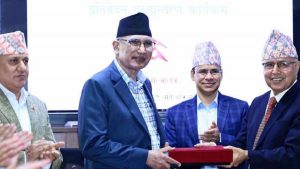A human waste treatment center built in Mechinagar-14 with a grant of over Rs 78.1 million from the Bill & Melinda Gates Foundation remains unused despite five years of operation. The center, established to convert human excreta from Jhapa’s Mechinagar, Birtamod, and Buddhashanti into organic fertilizer, has failed to function as intended.
The project was funded through the Asian Development Bank (ADB), with local governments contributing an additional Rs 13.7 million, bringing the total investment to over Rs 91.8 million. However, the facility has seen little success, with most of its infrastructure and equipment remaining idle.
Handed over to the Third Small Urban Water Supply and Sanitation Sector by the ADB, the center is now under the Charali Small Urban Water Supply and Sanitation Consumer Organization. The facility was designed to process fecal sludge into organic fertilizer, but it has not even conducted a single test production due to the lack of required resources.
Operational Challenges and Inefficiencies
Chairman of the organization, Rajan Chimaria, cited multiple challenges, including a shortage of fecal sludge, skilled technical manpower, and operational resources. He stated that while 150 tankers of sludge are needed monthly for effective processing, the facility has only been able to collect between 18 and 30 tankers per month.
“The issue lies in private tanker operators who prefer dumping waste into rivers and forests instead of paying Rs 500 per tanker to use the facility,” Chimaria explained. The center charges Rs 3,000 per tanker if it collects sludge from households directly, making the service costly and less attractive.
Currently, out of the 28 sludge processing tanks built at the center, 14 remain completely empty, and the remaining tanks are not being used efficiently. A high-tech laboratory for chemical and biological testing of sludge, water, and organic fertilizer has never been put to use due to a lack of trained personnel.
Secretary of the organization, Premraj Ghimire, highlighted that the facility incurs an annual maintenance cost of Rs 300,000 despite being non-operational. “The donor built the infrastructure, but no provisions were made for trained manpower and operational resources,” Ghimire said. He suggested that a new partnership model between the government and the private sector is needed to make the center functional.
The center includes a dedicated tanker for sludge transport, a two-story office building, a laboratory, several processing structures, and a concrete storage facility for drying and storing the fertilizer. However, without proper management, these assets remain underutilized.
Monitoring by Donor Team
On Sunday, a team from the Koshi Province government and a British donor agency conducted a field inspection of the Charali Fecal Waste Treatment Center. The monitoring team was led by Lisa, Water, Sanitation, and Hygiene Advisor at the UK Foreign, Commonwealth & Development Office (FCDO), alongside Krishna Prasad Rajbanshi, Head of the Drinking Water and Sanitation Division of Koshi Province.
During the visit, local officials, including Chairman Chimaria, former Chairman Lal Bahadur Thebe, and Secretary Ghimire, briefed the monitoring team on the current status and challenges. They urged immediate action to recruit laboratory technicians, repair equipment, deploy additional tankers and manpower, and implement legal provisions to prevent private tankers from dumping waste into the environment.
Despite the significant investment, the treatment center has yet to fulfill its purpose, with stakeholders now calling for urgent intervention to revive the project and put its infrastructure to proper use.














Comments